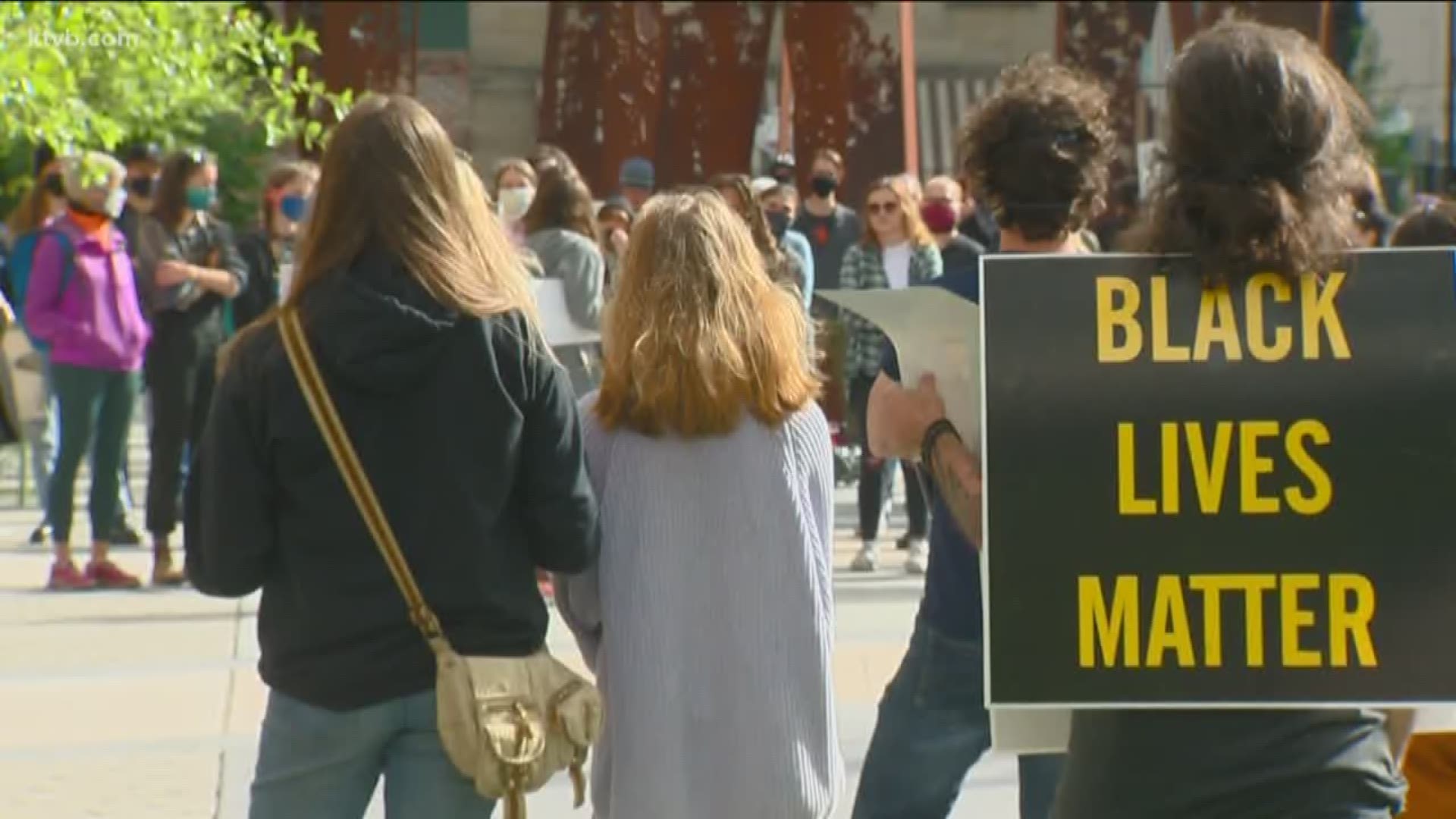BOISE, Idaho — Police reform was a topic of much discussion in Boise on Tuesday.
Around 100 community members showed up to City Hall Tuesday evening to advocate for defunding police and changes in how law enforcement operates.
Protestors sported signs reading, "Black Lives Matter" and various versions of "Defund the Police." They also chanted "No justice, no peace. Defund the police."
"We want to address the criminalization of black and brown skin, addiction, homelessness and mental illness," said one speaker at the rally.
Other speakers shared personal experiences of racism or bias by police as they called on city leaders for police reform.
Meanwhile, just an hour and a half prior to the rally, those same leaders held a virtual work session where the topic of police procedure was discussed.
The Boise City Council met with acting police chief Ron Winegar. He talked about where the Boise Police Department stands when it comes to compliance with the "Campaign Zero" police policies, better known as "8 Can't Wait."
Those policies include requiring officers to exhaust all alternatives before shooting a subject and to de-escalate situations whenever possible.
Winegar said BPD already practices both of those.
"Our goal is to always maintain distance, try to de-escalate a situation so that force is not necessary," he said.
Another policy requires that police give a verbal warning before shooting. According to Winegar, Boise Police are trained to do that except in situations where it's impossible, such as an active shooter.
Council member Lisa Sanchez asked Winegar to clarify what that warning would sound like.
"[We] identify ourselves as police, so 'Police, drop the gun,' 'Police, stop!' or 'Police, don't move,'" Winegar answered. "Something along those lines to get the subject's attention."
Three other "8 Can't Wait" policies deal specifically with the use of force. One limits the use of excessive force and weapons.
"Deadly force is always a last resort for us," Winegar said. "Of course, you have the extreme that occasionally does happen where if somebody is shooting at you, you don't pepper spray them, or tase them or pull out your baton if you're taking rounds. You have to deal with that threat as it comes."
Another policy calls for other officers to intervene if a colleague is unnecessarily or inappropriately using force.
According to Winegar, this is one area BPD could probably work more on developing.
"This is a place where we have the ability to make some tweaks on this," he said. "Again, we have policies in place for reporting but we can probably strengthen some policies around this."
Another "8 Can't Wait" point requires comprehensive reporting of any force used by police - and any threats of force by police.
Boise Police does report the use of force in formal reports. That would include the use of pepper spray, tasers and similar weapons. However, Winegar said threats of force are not typically documented.
He added that "soft, empty-hand control techniques", such as handcuffing a person with their arm behind their back, is considered force but is not reported in-depth. The arrest is recorded but no extensive report is typically done for that type of situation.
Council member Jimmy Hallyburton asked what type of demographic information is recorded in use of force reports.
"On that report, demographics are certainly captured as far as personal information: name, age, address, physical description, height, weight, those types of things as well as their race," Winegar answered.
Council member Elaine Clegg then asked whether there was any sort of demographic statistics or analysis in other areas, such as traffic stops or citations.
"The answer is mostly not," Winegar said. "There is not a place on a uniform Idaho citation to log a person's race."
When it comes to criminal reports such as misdemeanors or felonies, race is identified and can be tracked. But not on regular citations such as speeding tickets or other traffic infractions.
Any changes to that procedure would likely have to come from the state legislature, according to Winegar.
The remaining "8 Can't Wait" policies include not shooting at moving vehicles, which Boise Police will only do if absolutely necessary for public safety. And finally, no chokeholds or strangleholds.
"We absolutely do not allow chokeholds or strangleholds," Winegar said. "We have come to see strangulation as a felony crime in the State of Idaho."
He also told council members that department leadership reviews and amends the policy manual regularly.
Mayor Lauren McLean said Tuesday's discussion is the first of many more conversations to come on police procedure.
The City of Boise will welcome Ryan Lee as its new police chief on July 1 and McLean said the City Council plans to have more in-depth discussions on policy once he begins his new role.

